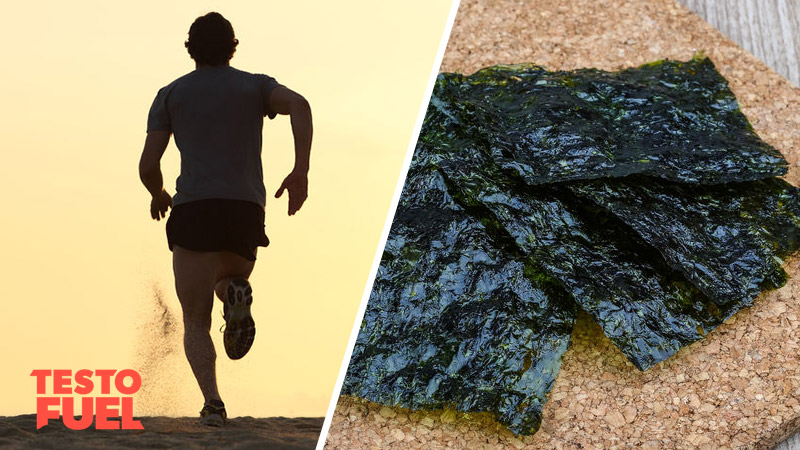TestoFuel Blog : Make Gains & Pack on the Muscle

An essential part of any lifestyle change is diet – to improve your health it is important to obtain all of the necessary energy through the nutrients that your body needs. One such nutrient is called iodine.
The purpose of this article is to introduce you to its role in health and tell you why it is essential to increasing your testosterone levels.
You will learn:
Iodine is a chemical element mineral that is bluish-black and found naturally in foods such as seaweed, fish, dairy products such as milk and yogurt, cranberries, eggs and potatoes.
It is essential to every organ, tissue and cell in your body and functions for a number of roles that are important in human development. This mineral improves sleep quality, mood and concentration as well as maintaining a functioning immune system, by removing heavy metals such as lead and mercury from the body.
Although it is essential, over 2 thousand million people worldwide are deficient in this mineral [1] and according to the World Health Organisation, 72% of people suffer from an iodine-related disorder.
This mineral also ensures efficient metabolism by combining with an amino acid called tyrosine to make the thyroid hormones T3, T4. Together, these hormones regulate both cellular metabolism and energy production.
The thyroid gland – which is located in your throat – is responsible for helping to control the growth and maturation of the human body.
This mineral increases thyroid output by stimulating thyroid hormone production, but a lack of the mineral will lead to a decrease, and subsequently a less than optimal metabolism. When this occurs, the clinical definition is hypothyroidism.
You only need a very small amount in your diet – around 150mcg per day although debate exists as to whether more is beneficial or harmful.
Key Point: Iodine is a chemical element mineral that supports sleep, mood and concentration. It is essential for proper thyroid function, metabolism and energy production.
Studies have shown that T3 stimulates testosterone production in the Leydig cells – specific cells located in the testes that produce testosterone in the presence of a hormone called luteinizing hormone (LH). Low levels of T3 contribute to low testosterone [2].
One of the key points of interest here is that patients with clinical hypothyroidism also show low levels of testosterone. One of the key hormone changes that occur with a deficient thyroid gland is that of decreased gonodal function [3].
A study in the journal Thyroid [3] found that men with hypothyroidism have lower testosterone levels and poor responses to LH.
Not only that but prolactin – a hormone that blunts testosterone – becomes elevated and so does estradiol – a type of estrogen found in high levels in females. This can lead to the development of breast-like tissue in men referred to as ‘gynecomastia’, which is common in hypothyroid men.
Likewise, a study in the American Journal of Medicine [4] found that out of 8 men with hypothyroidism, 50% had low T levels, gonad function was poor in 5 of the 8 men, and all were impotent.
The study concluded that abnormalities of gonadal function are common in men with primary hypothyroidism.
Importantly, research shows that all is not lost, and that T levels can be normalized once proper thyroid function resumes.
There are a number of thyroid receptors in the body. The prostate gland – a gland that secretes fluid that protects sperm – contains some of these receptors meaning that it requires iodine to complete its job properly.
When the prostate doesn’t function effectively it can grow in size. This is referred to as benign prostatic hypertrophy (BPH) and can lead to uncomfortable urination and increased risk of bladder infection.
Studies have found that 3mg per day of iodine can reduce the size of the prostate [5].
Key Point: Iodine is important for optimizing T levels. Patients with clinical hypothyroidism also show low levels of testosterone.
Iodine is a bluish-black chemical element found in foods such as seaweed and dairy. It is an essential mineral for health and controls sleep patterns, mood and concentration. Importantly, it also ensures efficient metabolism and energy production, as well as supporting the body through phases of growth and maturation.
Many people are deficient in this mineral and a number of conditions are associated with lower than optimal mineral levels. One such condition, hypothyroidism, occurs because of insufficient thyroid hormone levels – these are formed in the presence of iodine.
Research suggests that insufficient levels in the diet can have a negative impact on testosterone and luteinizing hormone, whilst elevating prolactin – a hormone that has an antagonistic effect on T levels. It is important that if you want to optimize your T levels, you ensure you get enough of this mineral in your diet.
As a premium brand Anabolic Support Complex, TestoFuel contains only the best best, natural ingredients scientifically proven to:
TestoFuel is ideal for improving your performance both in and out of the gym, and helping you attain that all-important muscular physique.